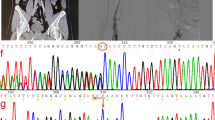Abstract
Hereditary antithrombin (AT) deficiency is an autosomal dominant inherited thrombophilia. In three pedigrees of hereditary type I AT deficiency, we identified novel variants c.126delC (p.Lys43Serfs*7), c.165C > G (p.Tyr55*), and c.546delA (p.Lys182Asnfs*102) in the open reading frame encoding AT in each patient. Each of these aberrant variants leads to premature termination of AT protein synthesis. To investigate whether these abnormal variants are involved in the pathogenesis of type I AT deficiency, we analyzed the function of these variants in HEK293 cells. Results of western blot analysis and immunofluorescence microscopy showed that all abnormal variants were expressed intracellularly, but p.Lys43Serfs*7 and p.Tyr55* protein were aggregated in the cells. These three variants were not detected in the spent culture medium, indicating that these novel variants affect protein secretion. In summary, we suggest that these variants in the AT-encoding gene are translated in the cell, but form abnormal proteins that form aggregates and/or inhibit secretion. These results provide insight into novel mechanisms of type I AT deficiency and potential therapies for the condition.



Similar content being viewed by others
Data Availability
Relevant data is available upon request.
References
Ehrhardt JD Jr, Boneva D, McKenney M, Elkbuli A. Antithrombin deficiency in trauma and surgical critical care. J Surg Res. 2020;256:536–42.
Perry DJ, Carrell RW. Molecular genetics of human antithrombin deficiency. Hum Mutat. 1996;7(1):7–22.
Caspers M, Pavlova A, Driesen J, Harbrecht U, Klamroth R, Kadar J, et al. Deficiencies of antithrombin, protein C and protein S-practical experience in genetic analysis of a large patient cohort. Thromb Haemost. 2012;108(2):247–57.
Mahmoodi BK, Brouwer JL, Ten Kate MK, Lijfering WM, Veeger NJ, Mulder AB, et al. A prospective cohort study on the absolute risks of venous thromboembolism and predictive value of screening asymptomatic relatives of patients with hereditary deficiencies of protein S, protein C or antithrombin. J Thromb Haemost. 2010;8(6):1193–200.
Sanson BJ, Simioni P, Tormene D, Moia M, Friederich PW, Huisman MV, et al. The incidence of venous thromboembolism in asymptomatic carriers of a deficiency of antithrombin, protein C, or protein S: a prospective cohort study. Blood. 1999;94(11):3702–6.
Vossen CY, Conard J, Fontcuberta J, Makris M, Van Der Meer FJ, Pabinger I, et al. Risk of a first venous thrombotic event in carriers of a familial thrombophilic defect The European Prospective Cohort on Thrombophilia (EPCOT). J Thromb Haemost. 2005;3(3):459–64.
Human Gene Mutation Database (HGMD) Professional 2022. Available at https://my.qiagendigitalinsights.com/bbp/view/hgmd/pro/start.php
De la Morena-Barrio B, Borràs N, Rodríguez-Alén A, de la Morena-Barrio ME, García-Hernández JL, Padilla J, et al. Identification of the first large intronic deletion responsible of type I antithrombin deficiency not detected by routine molecular diagnostic methods. Br J Haematol. 2019;186(4):e82–6.
Sekiya A, Morishita E, Karato M, Maruyama K, Shimogawara I, Omote M, et al. Two case reports of inherited antithrombin deficiency: a novel frameshift mutation and a large deletion including all seven exons detected using two methods. Int J Hematol. 2011;93(2):216–9.
Lane DA, Kunz G, Olds RJ, Thein SL. Molecular genetics of antithrombin deficiency. Blood Rev. 1996;10(2):59–74.
Mulder R, Croles FN, Mulder AB, Huntington JA, Meijer K, Lukens MV. SERPINC1 gene mutations in antithrombin deficiency. Br J Haematol. 2017;178(2):279–85.
Patnaik MM, Moll S. Inherited antithrombin deficiency: a review. Haemophilia. 2008;14(6):1229–39.
Antonarakis SE. Recommendations for a nomenclature system for human gene mutations nomenclature working group. Hum Mutat. 1998;11(1):1–3.
Olds RJ, Lane DA, Chowdhury V, De Stefano V, Leone G, Thein SL. Complete nucleotide sequence of the antithrombin gene: evidence for homologous recombination causing thrombophilia. Biochemistry. 1993;32(16):4216–24.
Tricine-SDS-PAGE SH. Nat Protoc. 2006;1(1):16–22.
Haider SR, Reid HJ, Sharp BL. Tricine-SDS-PAGE. Methods Mol Biol. 1855;2019:151–60.
Alhenc-Gelas M, Plu-Bureau G, Hugon-Rodin J, Picard V, Horellou MH, GFHT study group on Genetic Thrombophilia. Thrombotic risk according to SERPINC1 genotype in a large cohort of subjects with antithrombin inherited deficiency. J Thromb Haemost. 2017;117(6):1040–51.
Chiasakul T, De Jesus E, Tong J, Chen Y, Crowther M, Garcia D, et al. Inherited thrombophilia and the risk of arterial ischemic stroke: a systematic review and meta-analysis. J Am Heart Assoc. 2019;8(19): e012877.
Popp MW, Maquat LE. Organizing principles of mammalian nonsense-mediated mRNA decay. Annu Rev Genet. 2013;47:139–65.
Garagiola I, Valsecchi C, Lavoretano S, Oren H, Bohm M, Peyvandi F. Nonsense-mediated mRNA decay in the ADAMTS13 gene caused by a 29-nucleotide deletion. Haematologica. 2008;93(11):1678–85.
Acknowledgements
We are grateful to Prof. Hiroshi Kawasaki of the Department of Medical Neuroscience, Graduate School of Medical Sciences, Kanazawa University, for providing use of a confocal laser microscope. This work was supported by the MHLW Research Program on Rare and Intractable Diseases (Grant Number JPMH20FC1024 to EM) and by a Grant-in-Aid from the Ministry of Health, Labour and Welfare of Japan (Grant Number 20K22869-00 to SN).
Author information
Authors and Affiliations
Corresponding author
Ethics declarations
Conflict of interests
The authors declare that they have no conflicts of interest.
Additional information
Publisher's Note
Springer Nature remains neutral with regard to jurisdictional claims in published maps and institutional affiliations.
Supplementary Information
Below is the link to the electronic supplementary material.
About this article
Cite this article
Imai, Y., Nagaya, S., Araiso, Y. et al. Identification and functional analysis of three novel genetic variants resulting in premature termination codons in three unrelated patients with hereditary antithrombin deficiency. Int J Hematol 117, 523–529 (2023). https://doi.org/10.1007/s12185-022-03509-3
Received:
Revised:
Accepted:
Published:
Issue Date:
DOI: https://doi.org/10.1007/s12185-022-03509-3




